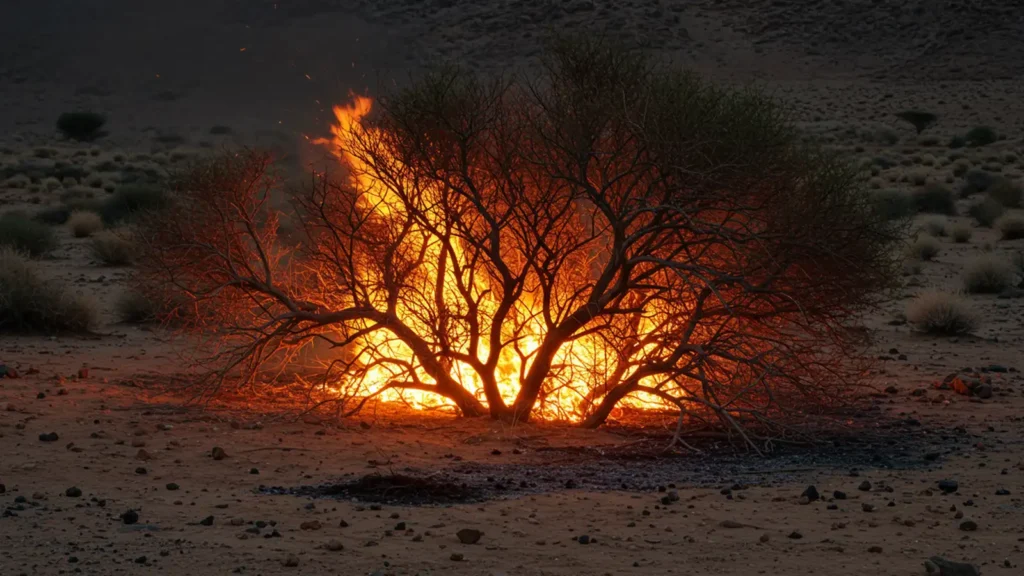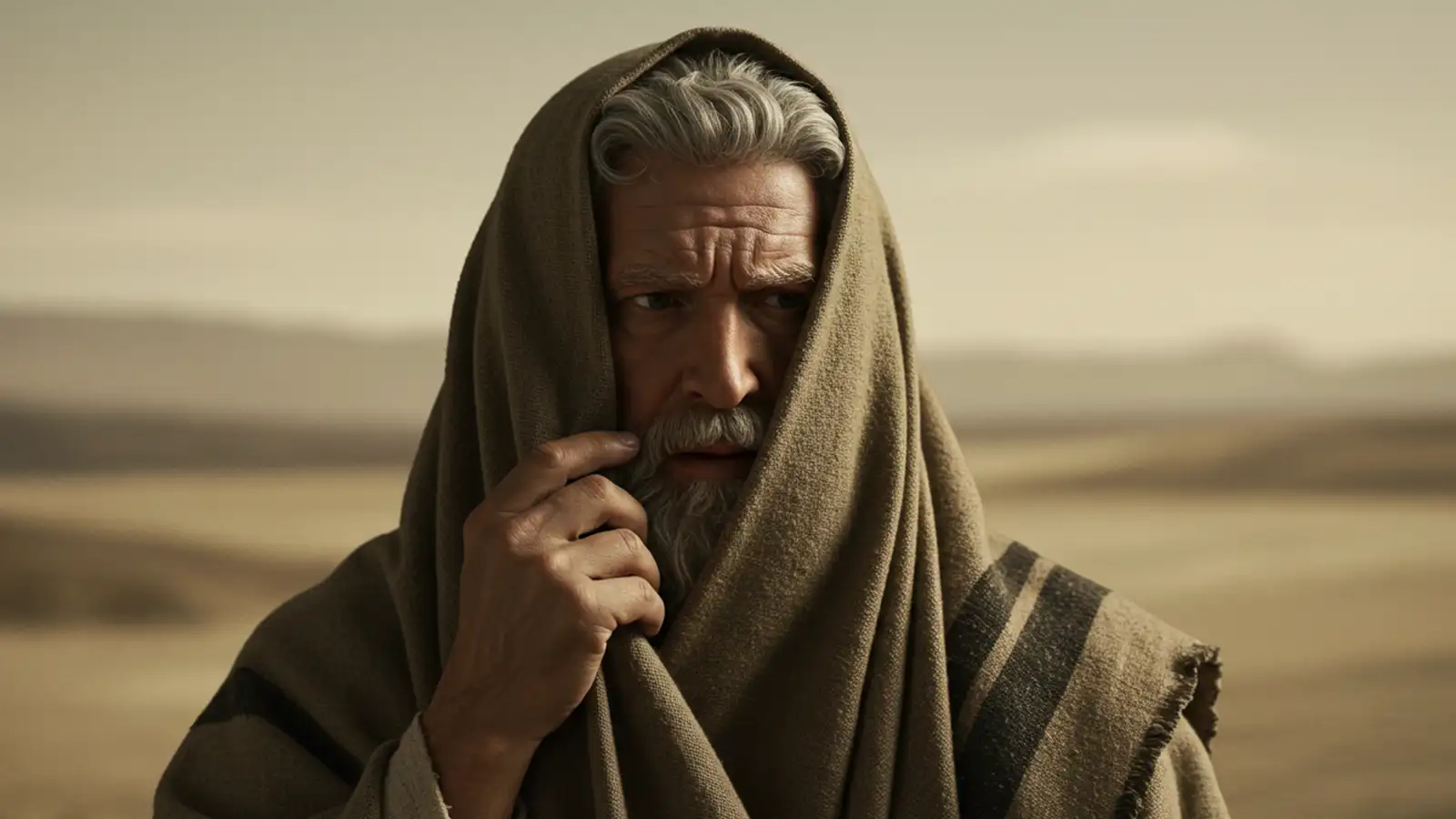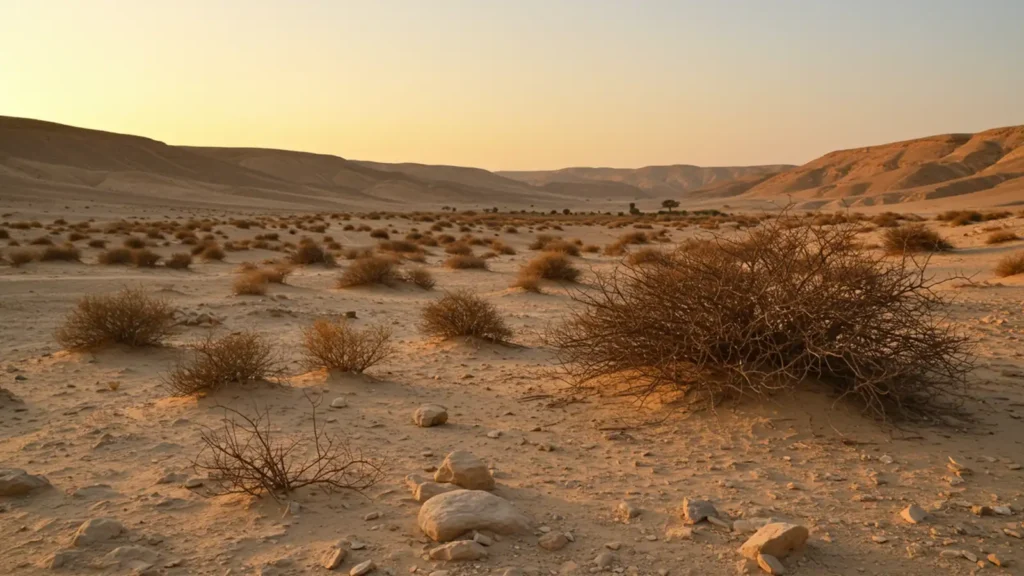Exodus 3 is one of the most extraordinary chapters in the Bible. It recounts the moment when God appears to Moses in the burning bush, revealing His identity and entrusting him with the mission of delivering the people of Israel from slavery in Egypt. This biblical text is filled with symbolism, spiritual lessons, and messages that have endured through the centuries.
From the historical context to the theological implications, exodus 3 remains a foundational passage for understanding faith, obedience, and mission. Let’s carefully analyze each detail and extract practical and profound lessons.
Index – Straight to the Point
Quick Summary
Exodus 3 is the biblical chapter in which God appears to Moses in the burning bush. In this encounter, the Lord reveals His identity, hears the cry of the people of Israel, and sends Moses to lead them to freedom.
Main points:
- 🔥 The burning bush: Moses sees a bush on fire that is not consumed, a sign of the divine presence.
- 🙏 Personal call: God calls Moses by name and asks for reverence, commanding him to remove his sandals.
- 📖 Exodus 3:4–9: God declares He has heard the people’s suffering in Egypt and sends Moses as deliverer.
- ✨ Exodus 3:14–15: God reveals His eternal name — “I AM WHO I AM” — and guarantees He will be remembered for all generations.
- 🕊 Central message: God calls ordinary people to great missions, and His presence is sufficient to sustain any task.
The Setting of Exodus 3
To understand the importance of exodus 3, it is essential to look at the setting in which the narrative takes place.
- Place: Desert of Midian, an arid and solitary region.
- Main character: Moses, about 80 years old, living as a shepherd.
- Historical context: The people of Israel suffered in Egypt, enslaved and oppressed by Pharaoh.
This context teaches that times of silence and apparent anonymity often prepare us for great missions.
The Burning Bush: The Miracle of Exodus 3
At the heart of exodus 3 is the phenomenon of the bush that burned but was not consumed. This detail captures Moses’ attention and leads him to an encounter with the divine.
Symbolic elements
- Bush: A simple, common, and seemingly insignificant shrub.
- Fire: A symbol of the divine presence, purification, and power.
- Not being consumed: Represents God’s eternity and constancy.
This episode shows that God can reveal Himself through what is simple, yet the effect is always grand.

The Call of Moses in Exodus 3
As he approaches the bush, Moses hears his own identity being called: “Moses, Moses.” This indicates personal care and intimacy.
Lessons from the call
- God knows each person by name.
- The divine mission is specific.
- The human response requires reverence.
God asks Moses to remove his sandals because he is on holy ground. This gesture signifies recognition of holiness and the need for humility before the Eternal One.
The Name of God in Exodus 3
The climax of the chapter is the revelation of the divine name: I AM WHO I AM.
Meanings
- Self-existence: God depends on nothing.
- Eternity: He has always existed and always will.
- Immutability: He does not change with circumstances.
- Constant presence: He is always with His people.
This name echoes throughout the Bible and is taken up by Jesus in the New Testament in expressions such as “I am the bread of life” and “I am the light of the world.”
The Mission Given in Exodus 3
God reveals His plan to Moses: to deliver Israel from slavery. Moses, however, shows insecurity.
Difficulties presented by Moses
- “Who am I to go to Pharaoh?”
- “What if they don’t believe me?”
- “I’m not eloquent.”
God’s answers
- “I will be with you.”
- “I AM has sent me to you.”
- “I will perform signs and wonders.”
This interaction shows the contrast between human weakness and divine strength.
Spiritual Lessons from Exodus 3
The chapter is not just a historical narrative but a source of timeless principles.
In list form:
- Personal call: God relates to people individually.
- Mission greater than human capacity: Teaches dependence on the Lord.
- Holiness: Recognition of the difference between the divine and the human.
- Compassion: God hears the cry of the afflicted.
- Revelation: Knowledge of God is progressive, revealed in His time.
Comparison: Exodus 3 and Other Biblical Calls
| Character | Context | Initial reaction | God’s response |
|---|---|---|---|
| Moses (Exodus 3) | Shepherding sheep in the desert | Fear and insecurity | “I will be with you” |
| Isaiah (Isaiah 6) | Temple filled with God’s glory | “Woe is me, I am sinful” | Purification with the live coal |
| Jeremiah (Jeremiah 1) | Young man called to prophecy | “I am only a child” | “I will put my words in your mouth” |
| Gideon (Judges 6) | Oppressed by the Midianites | “I am the least in my family” | “Go in this your strength” |
This table shows that, just as in exodus 3, biblical callings always face human fear but are strengthened by the divine presence.

Exodus 3 Fully Explained Verse by Verse
Exodus 3:1
“Now Moses kept the flock of Jethro his father-in-law, the priest of Midian; and he led the flock to the back of the desert, and came to the mountain of God, to Horeb.”
Here we see Moses in his routine as a shepherd. He was no longer a prince of Egypt and now cared for sheep in anonymity. This period symbolizes preparation and humility before the call. The “Mount Horeb,” later known as Sinai, would be the stage for great revelations.
Exodus 3:2
“And the Angel of the Lord appeared to him in a flame of fire from the midst of a bush; and he looked, and, behold, the bush burned with fire, and the bush was not consumed.”
God manifests Himself in an extraordinary way through an ordinary shrub. The fire, a symbol of holiness and the divine presence, does not destroy the bush. This detail reveals God’s eternal and inexhaustible character.
Exodus 3:3
“And Moses said, I will now turn aside and see this great sight, why the bush is not burnt.”
Moses shows spiritual curiosity. He decides to draw near to understand the phenomenon. This movement of seeking opens the way for his experience with God.
Exodus 3:4
“And when the Lord saw that he turned aside to see, God called unto him out of the midst of the bush, and said, Moses, Moses. And he said, Here am I.”
God’s call is personal and direct. He calls Moses by name, showing intimacy. The answer “Here am I” reveals availability, even without knowing the mission that would follow.
Exodus 3:5
“And he said, Draw not nigh hither: put off thy shoes from off thy feet, for the place whereon thou standest is holy ground.”
The command to remove the sandals indicates reverence. That ground was not holy in itself but became holy because of the divine presence. It reminds us that God’s presence transforms the ordinary into the extraordinary.
Exodus 3:6
“Moreover he said, I am the God of thy father, the God of Abraham, the God of Isaac, and the God of Jacob. And Moses hid his face; for he was afraid to look upon God.”
God presents Himself as the same God of the patriarchs, reaffirming the continuity of the covenant. Moses covers his face in fear, recognizing his smallness before divine glory.
Exodus 3:7
“And the Lord said, I have surely seen the affliction of my people which are in Egypt, and have heard their cry by reason of their taskmasters; for I know their sorrows.”
Here God shows compassion. He sees, hears, and knows the people’s suffering. His attention demonstrates that human outcry does not go unnoticed.
Exodus 3:8
“And I am come down to deliver them out of the hand of the Egyptians, and to bring them up out of that land unto a good land and a large, unto a land flowing with milk and honey; unto the place of the Canaanites, and the Hittites, and the Amorites, and the Perizzites, and the Hivites, and the Jebusites.”
God announces His plan: to free Israel and lead them to a fertile and prosperous land. The promise of the “land flowing with milk and honey” represents abundance and blessing.
Exodus 3:9
“Now therefore, behold, the cry of the children of Israel is come unto me: and I have also seen the oppression wherewith the Egyptians oppress them.”
The Lord reaffirms that the people’s suffering has come before Him. This repetition strengthens the message that God is attentive and just.
Exodus 3:10
“Come now therefore, and I will send thee unto Pharaoh, that thou mayest bring forth my people the children of Israel out of Egypt.”
Moses receives the mission: to be Israel’s deliverer. The call is clear and challenging.
Exodus 3:11
“And Moses said unto God, Who am I, that I should go unto Pharaoh, and that I should bring forth the children of Israel out of Egypt?”
Moses feels his inadequacy. His question shows humility and fear in the face of responsibility. He does not consider himself worthy of such a mission.
Exodus 3:12
“And he said, Certainly I will be with thee; and this shall be a token unto thee, that I have sent thee: When thou hast brought forth the people out of Egypt, ye shall serve God upon this mountain.”
God’s response does not exalt Moses but guarantees His presence. The success of the mission would not depend on human strength but on the faithfulness of the “I AM.”
Exodus 3:13
“And Moses said unto God, Behold, when I come unto the children of Israel, and shall say unto them, The God of your fathers hath sent me unto you; and they shall say to me, What is his name? what shall I say unto them?”
Moses anticipates the people’s reaction. He knows the Israelites would ask for a clear identification of divine authority. His question reveals both prudence and insecurity.
Exodus 3:14
“And God said unto Moses, I AM THAT I AM: and he said, Thus shalt thou say unto the children of Israel, I AM hath sent me unto you.”
God reveals His eternal name: I AM WHO I AM (in Hebrew, “Ehyeh-Asher-Ehyeh”). This expression shows that God is eternal, self-existent, and unchanging. He depends on nothing, but everything depends on Him.
Exodus 3:15
“And God said moreover unto Moses, Thus shalt thou say unto the children of Israel, The Lord God of your fathers, the God of Abraham, the God of Isaac, and the God of Jacob, hath sent me unto you: this is my name for ever, and this is my memorial unto all generations.”
Besides revealing “I AM,” God reaffirms His identity as the God of the patriarchs. The name would serve as an eternal memorial, reminding Israel of the covenant and divine faithfulness.
Exodus 3:16
“Go, and gather the elders of Israel together, and say unto them, The Lord God of your fathers, the God of Abraham, of Isaac, and of Jacob, appeared unto me, saying, I have surely visited you, and seen that which is done to you in Egypt.”
God instructs Moses to speak first with Israel’s leaders, assuring them He has not forgotten the people’s suffering. This reinforces a leadership and unity strategy before facing Pharaoh.
Exodus 3:17
“And I have said, I will bring you up out of the affliction of Egypt unto the land of the Canaanites, and the Hittites, and the Amorites, and the Perizzites, and the Hivites, and the Jebusites, unto a land flowing with milk and honey.”
The promise is reaffirmed: God would bring His people out of oppression and into a fertile and abundant land, already inhabited by other peoples. This land symbolizes inheritance, promise, and victory.
Exodus 3:18
“And they shall hearken to thy voice: and thou shalt come, thou and the elders of Israel, unto the king of Egypt, and ye shall say unto him, The Lord God of the Hebrews hath met with us: and now let us go, we beseech thee, three days’ journey into the wilderness, that we may sacrifice to the Lord our God.”
God assures that the elders would believe Moses. The first approach to Pharaoh would be a request for a three-day religious journey— a diplomatic way to begin the process of liberation.
Exodus 3:19
“And I am sure that the king of Egypt will not let you go, no, not by a mighty hand.”
God already announces Pharaoh’s resistance. This shows that Moses’ mission would not be simple but would depend on divine intervention.
Exodus 3:20
“And I will stretch out my hand, and smite Egypt with all my wonders which I will do in the midst thereof: and after that he will let you go.”
Here is the promise of the plagues and mighty signs. Pharaoh would not yield of his own will but would be compelled by the demonstration of God’s power.
Exodus 3:21
“And I will give this people favour in the sight of the Egyptians: and it shall come to pass, that, when ye go, ye shall not go empty.”
Beyond deliverance, God promises restitution. The Israelites would not leave empty-handed but with goods symbolizing justice and compensation for slavery.
Exodus 3:22
“But every woman shall borrow of her neighbour, and of her that sojourneth in her house, jewels of silver, and jewels of gold, and raiment: and ye shall put them upon your sons, and upon your daughters; and ye shall spoil the Egyptians.”
God announces that the Israelites would receive wealth as they left Egypt. This fulfills the promise made to Abraham (Genesis 15:14), where He said His people would come out with great possessions. It represents not only deliverance but also victory.

Curiosities from Exodus 3
- Jewish tradition associates the burning bush with Israel’s perseverance amid persecution.
- The name of God revealed here is considered one of the most sacred in the Old Testament.
- The burning bush became a symbol on coats of arms and logos of various Christian institutions.
- Some scholars believe the site of the episode was near Mount Horeb, also called Sinai.
Applications of Exodus 3 for Today
Although the episode took place thousands of years ago, its lessons remain current.
- Personal callings still exist: Each person has a specific mission.
- God still hears cries for help: Human suffering does not go unnoticed.
- The divine presence makes the difference: What sustains the mission is not human strength, but the “I AM.”
- The simple can be used: As with the bush, God uses what seems small to reveal the great.
Frequently Asked Questions about Exodus 3
What does Exodus 3 say?
Exodus 3 narrates Moses’ calling at the burning bush. God appears in fire that is not consumed, reveals His eternal name, hears the people’s cry in Egypt, and sends Moses to free the Israelites from slavery, promising to lead them to the Promised Land.
What is the explanation of Exodus 3?
The chapter shows that God reveals Himself as eternal and holy, calls Moses to a mission impossible in human eyes, and guarantees His presence. The narrative teaches that God hears the cry of the oppressed, chooses ordinary people for great tasks, and that His presence is what sustains victory.
What did God say to Moses in Exodus 3:4–9?
God called Moses by name, asked him to remove his sandals because he was on holy ground, revealed Himself as the God of the patriarchs, and declared that He had seen Israel’s affliction in Egypt. He promised to deliver them from oppression and lead them to a fertile land.
What did God say to Moses in Exodus 3:14–15?
In this passage, God revealed His name: “I AM WHO I AM”. He commanded Moses to tell the Israelites that the “I AM” had sent him and reaffirmed that He is the God of Abraham, Isaac, and Jacob. This would be His eternal name, remembered by all generations.
Why did Moses need to take off his sandals?
Moses removed his sandals because he stood in God’s presence. The gesture symbolized reverence and humility, recognizing the holiness of the place. The ground became holy not by itself, but because God was there.
What do we learn today from Exodus 3?
We learn that God still calls ordinary people to extraordinary missions, that He hears the cry of those who suffer, and that His presence is enough to overcome any challenge. We also understand that reverence before the sacred is essential.

Conclusion
Exodus 3 unites history, revelation, and spirituality. The experience of the burning bush shows that God manifests Himself amid the ordinary to accomplish the extraordinary. He calls, sends, and enables—even in human weakness.
This chapter remains a powerful reminder that the presence of the “I AM” is sufficient to transform lives and lead entire peoples toward freedom.
Glossary of Exodus 3
Burning bush
A bush that appeared in flames before Moses, yet was not consumed. It represents God’s eternal and holy presence.
Mount Horeb (or Sinai)
A mountain located in the desert, considered “the mountain of God.” It was the site of the burning bush and, later, of the giving of the Ten Commandments.
Taskmasters
A term used to designate the Egyptian overseers or supervisors who forced the Israelites into hard labor.
Land flowing with milk and honey
A biblical expression symbolizing the fertility, abundance, and prosperity of the land God promised to Israel.
Patriarchs
The forefathers Abraham, Isaac, and Jacob, who received from God the first promises of the covenant with Israel.
I AM WHO I AM
The name revealed by God to Moses, indicating that He is eternal, self-existent, unchanging, and ever-present.
Elders of Israel
Leaders of the Hebrew people at the time, responsible for representing and guiding the community’s decisions.
Plunder the Egyptians
An expression indicating Israel’s departure from Egypt carrying silver, gold, and clothing as a form of restitution for years of slavery.
READ ALSO:
- What is the Alma de Cristo prayer?
- Ephesians 3:20 – A God Who Does Immeasurably More
- Psalm 123 – Hope of Eyes Lifted to the Lord
FOLLOW US ON FACEBOOK